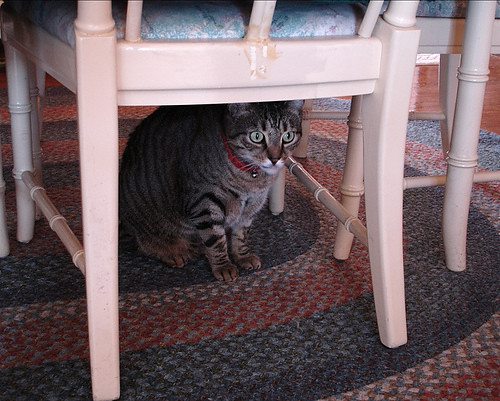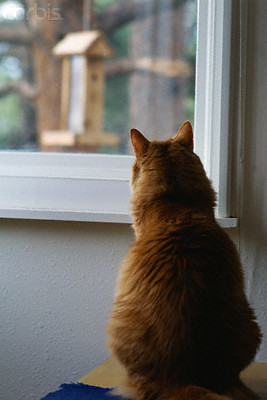After yet another visit to the veterinarian with my 18 year old cat; Matilda, I decided it may be a good time to address what it's like to care for a senior cat. You may remember Matilda from previous posts such as : My Alarm Clock Is Hungry & My Cat Made Me Do It. This time around, the exam shows the onset of kidney disease. As it is, I give Matilda subcutaneous fluids a few times a week to keep her well hydrated and functioning as normal as possible. Although, Matilda habitually defies normalcy, as you can see in her other stories. Her failing health, coupled with cognitive dysfunction (Catzheimers) make caring for her a lesson in life's mysteries.
Sure, there are challenges, disappointments, reality checks and unknown territory behind every corner, but I have news for you.... Some day, your cat will grow old too and it will suddenly occur to you that kitty is not the sharp, nimble footed acrobat s/he once was. Caring for elderly cats is not as bad as some make it out to be. It's just life's reminder that nothing lasts forever. Why not help your cat along the way with dignity and grace?
When is a cat considered a senior?
Cats often initially show age related physical changes between the ages of seven and ten years. Most human companions will notice differences, both physically and behaviorally in their cat, by the time the kitty is twelve. In my case, I started to see signs of aging in Matilda around fifteen. It's been a long three years since then!
You may notice some of these common signs of aging in your cat:
Many cats will have some difficulty jumping or climbing onto higher surfaces due to arthritis.
- Your cat may be less diligent about grooming himself. (Their hair can appear matted or greasy)
- Changes (in environment or routine) may be more difficult to adjust to.
- Increased vocalization, or meowing is louder than usual.
- Your cat may sleep more (ok, more than usual).
- Decrease in energy and zest for play.
- Change in appetite or refusal to eat.
- Litter box avoidance or aversion.
- An increase in aggression due to pain or confusion.
- Some cats become more relaxed and mellow, and may be more accepting of petting or medicating.
Ways to Accommodate an Older Cat’s Special Needs
For cats with arthritis or joint pains, ramps or stairs covered with carpeting are helpful to make access to sofas, beds, or other favorite resting places easier. There are also elevated food and water dishes available if your kitty has trouble with neck pain.
If your kitty is not grooming well, you will need to help out. Matted coats, particularly on long-haired cats are unhealthy and uncomfortable. Regular grooming is good for their fur and for skin-circulation, and many cats enjoy being brushed. Try a few different style brushes to see which your cat prefers.
Hear no evil, See no evil, Taste no evil
As hearing and sight become less acute, you may notice you cat lumbering around the house or even hiding as a result. Adding night lights or providing extra light in general is a thoughtful accommodation. If blindness appears suddenly, then it will be more obvious with the cat noticeably bumping into furniture or walls. Restricting territory or padding sharp corners of low furniture will prevent injury. In the case of hearing loss, a lack of response to sounds, coming when called (most cats ignore you anyway), or an increased vocalization or disorientation may also be apparent.
Some cats will become picky about food. This is best discussed with a veterinarian as it can indicate a tooth/gum condition or other health problem. However, some elderly pets may just need to be tempted to eat. It can help to feed smaller, more frequent meals. They may be more responsive to fresh food, or food that has been gently heated, as they can often smell it better. Older cats need to drink plenty of water, and it may be necessary to try several different water sources to insure they are drinking.
Routine is the key!
Adjusting to sudden change is difficult for most cats, but more so for older kitties. Make any changes in the environment or routine gradually. Something as simple as a variation in daily schedules can be an upset. Trying to keep as much routine as possible for your cat will be very helpful in reducing stress. This means keeping cat bedding and furniture in its usual place, and having regular times for feeding, cuddling, grooming and other interactions each day.
Gentle exercise is a great stress reducer and can maintain health. This gives them a chance for mental stimulation without a lot of physical activity. Having a spot in a sunny window to observe outdoor wildlife might be fun, too.
Preventative and Basic Care
Your senior pet should have a full examination by a veterinarian every six months, even if she seems perfectly healthy. If medical problems are diagnosed and treated early on, the treatment may be more effective and less costly. Some degenerative processes can be slowed down when detected early. These regular check-ups are the time for you to discuss with your vet any changes in behavior, appetite or sleeping habits.
We love them when they are kittens, but when they grow old they need us most. Shelters across the country have many senior cats that are looking for compassionate humans to watch over them in their golden years. Please check out amazing cats like MONKEY!
MONKEY 16 yr old with plenty of pep!






No comments:
Post a Comment